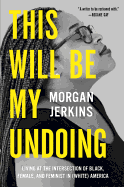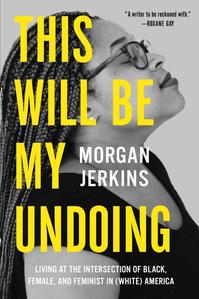
 In a confident voice, 20-something Catapult contributing writer Morgan Jerkins shares her experiences as a black, female feminist in the United States. This debut collection--a series of emotionally charged essays--"is not a one-size-fits-all tale about black womanhood," Jerkins points out. "The particular experience of the black woman in modern America needs to be addressed. But there isn't just one; there are many. Millions to be exact." Jerkins's alone is the subject of This Will Be My Undoing, and the book allows readers to peer into the lens through which she has viewed the first three-plus decades of her life.
In a confident voice, 20-something Catapult contributing writer Morgan Jerkins shares her experiences as a black, female feminist in the United States. This debut collection--a series of emotionally charged essays--"is not a one-size-fits-all tale about black womanhood," Jerkins points out. "The particular experience of the black woman in modern America needs to be addressed. But there isn't just one; there are many. Millions to be exact." Jerkins's alone is the subject of This Will Be My Undoing, and the book allows readers to peer into the lens through which she has viewed the first three-plus decades of her life.
The opening essay, "Monkeys Like You," takes the audience back to Jerkins's suburban New Jersey elementary school, where she tries out for the cheerleading squad unsuccessfully. The description of her disappointment is heartbreaking, and anyone who's failed to make a team or achieve a goal will connect with that feeling of dejection and worthlessness. But the added element of discrimination causes Jerkins to look back later and decide, "It wasn't simply because I wasn't good enough to make the team. I couldn't make the team because I was not human.... And maybe that was what I was really trying out for, not a cheerleading squad, a chance to be a person."
Jerkins continues to open her world to readers, portraying her teenage years faced with unreasonable standards of beauty--including hair care for black women--and being sexualized while trying to avoid derogatory labels like "fast-tailed girl." She writes about relationship issues and her education at Princeton, as well as her present life in Harlem, with continuing hopes--and fears--for a future family of her own. She's matter-of-fact when releasing her anger and frustrations through the words on her page. Jerkins struggles with the murders of Trayvon Martin and Michael Brown while simultaneously confronting questions like, "How do we protect ourselves if that means chastising black men, whom we have always been culturally conditioned to protect? What does this dual protection look like, and is it attainable in a society that sanctions violence against black bodies?"
Jerkins's essays present many legitimate issues faced by black women. There are, however, instances in which she presents theories as fact (the Hottentot Venus influencing the 19th-century bustle style in women's dresses, for example) and makes arguable, sweeping generalizations, like "White women are not pressured to look like anyone else but themselves." Nevertheless, Jerkins has strong character, and This Will Be My Undoing is likely just the beginning of her influence on the role of black women in the United States. As she is careful to point out, she is just one voice and her story doesn't speak for all black women, but with any luck her one voice will inspire other voices to add to the chorus of change. --Jen Forbus, freelancer
Shelf Talker: A millennial writer from suburban New Jersey makes her debut with a collection of essays about her experiences growing up black and female in 21st century America.

